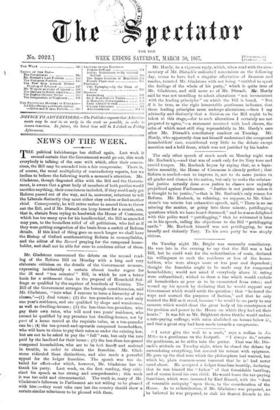Mr. Hardy, in a vigorous reply, which, when read with
the com- mentary of Mr. Disraeli's unlimitel concessions on the following day, seems to have had a singular affectation of firmness and resolve, taunted Mr. Gladstone with not being "entitled to speak the feelings of the whole of his party," which is quite true of Mr. Gladstone, and still more 53 of Mr. Disraeli. Mr. Hardy said he was not unwilling to admit alterations "not inconsistent with the leading principles" on which the Bill is based. " But if it be true, as the right honourable gentleman indicates, that these leading principles must undergo alterations,—then I say advisedly and distinctly that a division on the Bill ought to be taken at this stage,—for to such alterations I certainly am not prepared to agree,"—a statement received with loud cheers, the echo of which must still ring reproachfully in Mr. Hardy's ears after Mr. Disraeli's conciliatory candour on Tuesday. Mr. hardy, who apparently does not himself understand the compound householders' case, contributed very little to the debate except assertion and a bold front, which was not justified by his leader.


































